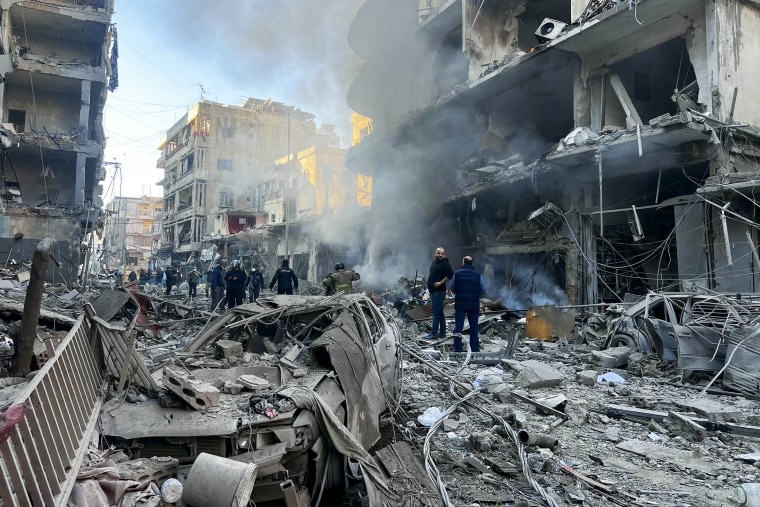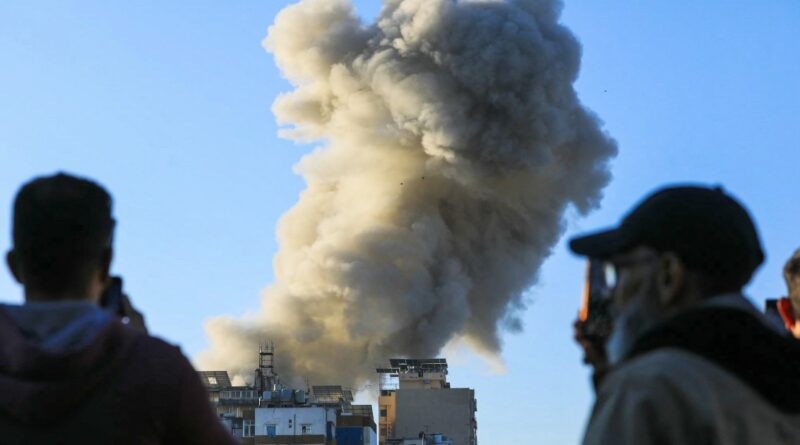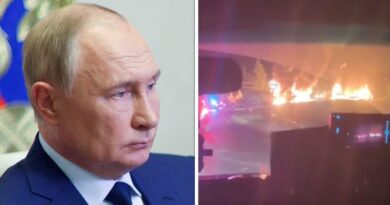Lebanese cease-fire efforts inch ahead as Israel keeps up fierce bombardment
Diplomacy aimed at securing a cease-fire in Lebanon showed tentative signs of progress on Friday as Israel pounded its northern neighbor including heavy airstrikes on the stronghold of militant group Hezbollah near Beirut.
Pressing its offensive against the Iran-backed group, Israel hit Beirut’s Hezbollah-controlled southern suburbs on Thursday, carrying out intense attacks there for a third consecutive day.
Plumes of smoke rose over the suburbs known as Dahiyeh, where the Israeli military said its fighter jets targeted weapons warehouses, military headquarters and other Hezbollah sites. In addition, Israeli strikes in the eastern city of Baalbek killed at least 15 members of the country’s civil defense, according to the region’s governor.
In a more hopeful sign, the U.S. ambassador to Lebanon submitted a draft truce proposal to halt fighting between Hezbollah and Israel to Lebanon’s speaker of parliament Nabih Berri on Thursday, an adviser to the speaker, Ali Hamdan, told NBC News.
The Reuters news agency first reported the proposal.Hopes have been buoyed before, notably late last month when Lebanon’s prime minister expressed optimism a cease-fire could be reached before the end of October.

The U.S. proposal has 13 points that have all been agreed on, an official from the office of the speaker told NBC News. Now the key is fine-tuning the wording, the official said.
The proposal calls for the full implementation of U.N. Security Council Resolution 1701, which ended a 2006 war between Israel and Hezbollah, the official said. It also calls for a series of steps to be taken in the following order in the first 60 days, according to the source: The complete withdrawal of Israeli forces from Lebanese territory; Lebanese forces and U.N. peacekeepers to take over the buffer zone; Hezbollah to move north of Litani river.
On the Lebanese side, the source said, the fear is that Israel will pull out at the last moment, as it did at the end of September when Israel backed out and assassinated Hezbollah chief Hassan Nasrallah.
The source said that critical talks would be held over the next 72 hours with an announcement possibly — and hopefully — coming next week.
In Israel, Eli Cohen, the country’s energy minister and a member of its security cabinet, on Thursday said prospects for a cease-fire were the most promising since the conflict began.
He told Reuters: “I think we are at a point that we are closer to an arrangement than we have been since the start of the war”.
The Biden administration is making a push for peace in the waning time before President-elect Donald Trump takes office in January.
Meanwhile, the Washington Post reported that Israeli Prime Minister Benjamin Netanyahu was rushing to advance a Lebanon ceasefire with the aim of delivering an early foreign policy win to Trump, who is expected to be strongly pro-Israel.
Months of U.S. efforts to broker a deal between Washington’s ally Israel and Hezbollah have so far failed. Israel launched a stepped-up air and ground campaign in Lebanon in late September after nearly a year of cross-border clashes in parallel with the Gaza war.
In another potentially promising sign, a senior Lebanese official signalled that Hezbollah would pull its forces away from the Lebanese-Israeli border under a ceasefire.
The official, Ali Hassan Khalil, told Al Jazeera late on Wednesday that Lebanese negotiators had reached agreement on “a certain text” with White House envoy Amos Hochstein during his last visit to Beirut in late October.
Hochstein had been due to communicate this to the Israeli side and then send any remarks back to Beirut, Khalil said. “We are waiting, and God willing, soon there will be the draft that he has reached,” he said.
A key sticking point for Israel, Cohen said, is ensuring it retains freedom to act should Hezbollah return to border areas. Khalil rejected this demand.
He said Lebanon was ready to “precisely” implement Resolution 1701.
Its terms require Hezbollah to remove fighters and weapons from areas between the border and the Litani River, which runs about 20 miles from Lebanon’s southern border.
The U.S. and other powers say a ceasefire must be based on Resolution 1701.
After 2006, Israel complained Hezbollah fighters and weapons remained in the border are while Lebanon accused Israel of violating the resolution by sending warplanes into its airspace.
The United Nations would bolster its peacekeeping mission in Lebanon to support the Lebanese army during a truce but would not directly enforce a ceasefire, U.N. peacekeeping chief Jean-Pierre Lacroix said on Thursday.
Khalil said Lebanon had no objection to U.S. or French participation in overseeing ceasefire compliance.
A World Bank report estimated the cost of physical damage and economic losses due to the conflict in Lebanon at $8.5 billion — a massive price for a country still suffering the effects of a financial collapse five years ago.
According to Lebanon’s health ministry, Israeli attacks have killed at least 3,386 people through Wednesday since Oct. 7, 2023.
Hezbollah attacks have killed about 100 civilians and soldiers in northern Israel, the Israeli-occupied Golan Heights and southern Lebanon over the last year, according to Israel.





